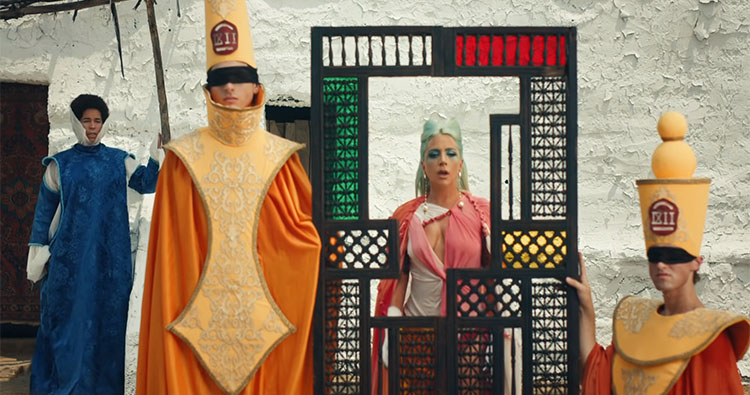Lady Gaga's latest music video honours masterpiece of Georgian-Armenian filmmaker Sergei Parajanov [VIDEO]

A still from '911', the new music video by Lady Gaga and director Tarsem Singh. Screenshot from video.
A 1969 masterpiece of auteur cinema by Georgian-Armenian filmmaker Sergei Parajanov is paid tribute in the latest video by Lady Gaga, with 911 - the singer and songwriter's collaboration with video director Tarsem Singh - recreating shots of The Colour of Pomegranates.
Bringing Grammy Award-winning Singh's long-time idea to fruition, the recreation of the visuals of Parajanov's Soviet-era classic features all the hallmarks of the original - vibrant colours, varied fabrics and surreal costumes.
The resemblances are very direct, with several cinema-themed accounts on social media juxtaposing scenes from the two productions for illustrating the similarity.
The Colour of Pomegranates is one of the highlights from the legacy of Parajanov, born in Tbilisi in 1924. The director wrote and directed the feature-length work in 1969, involving a cast of Georgian and Armenian actors, most prominently Sofiko Chiaureli, an icon of Soviet-era Georgian film.
The Color of Pomegranates (1969)
— CINEMA 505 (@CINEMA505) September 18, 2020
LADY GAGAAAAAAAA #911video pic.twitter.com/QH6G9uSyvD
911 - Lady Gaga (2020) | The Color of Pomegranates - Sergei Parajanov (1968)#911video pic.twitter.com/EG2n27yUZL
— dios dandanie era (@joshxmachina) September 18, 2020
An artistic biography of the 18th century Armenian poet Sayat-Nova, the film narrates about chapters of the artist's life mostly to the backdrop of music and singing, with only a few lines of speech. The filmmaker himself credited Armenian miniature as his inspiration for the film.
Upon the completion of its production, the feature fell victim of Soviet cultural censorship, deemed to be diverging from the accepted style of Socialist Realism. The material was handed to film director and screenwriter Sergei Yutkevich with the task of editing it.
An admirer of Parajanov, Yutkevich minimised his interference in the work. Parajanov was initially disappointed by the revisions, but later credited Yutkevich with "saving” his film.
A number of restorations of The Colour of Pomegranates, with the goal of moving the work to the digital medium, were attempted in the recent decades, with one restored version screened across Europe in 2015.
A recent biopic on Parajanov himself went on the big screen in Tbilisi in 2014.
 Tweet
Tweet  Share
Share